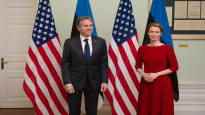The Baltic states believe the Russian threat will return – perhaps worse – after the war in Ukraine. Security is being sought from U.S. forces and Germany.
US Secretary of State Antony Blinken visited all three Baltic countries from the beginning of the week. Again, an assertion was heard about NATO’s commitment to defending Estonia, Latvia and Lithuania.
– We will defend every centimeter of the NATO area with all our joint strength, Blinken said in Tallinn.
Director of the Estonian Foreign Policy Institute Kristi Raikin According to him, Estonia is satisfied with NATO’s response to Russia’s invasion of Ukraine.
Britain has brought 850 more troops to Estonia, the United States combat helicopters to Latvia and Germany rollers to Lithuania. The numbers are not very large, but they are enough so far.
Russian troops have been taken to Ukraine from the vicinity of Estonia and Latvia and will not return in good condition. One of the nearby Russian brigades has even been withdrawn from the front due to losses.
However, it is known in the Baltic countries that Russia’s adversity in Ukraine does not mean a carefree future. A long period of instability is coming.
– Russia’s imperialist aspirations will survive the war, says Kristi Raik.
Researcher at the Estonian Center for International Defense Research Martin Hurt says that in time Russia will replenish and strengthen its troops that have suffered fighting losses.
– However, international sanctions are slowing down Russia’s arms production. This is especially true for precision weapons and missiles, the manufacture of which requires state-of-the-art technology. They have been used a lot in the war in Ukraine, says Hurt.
Estonia and the other Baltic countries hope so NATO is setting up strong permanent forces in its territory – Blinken’s tour of the Baltic capitals probably talked about this as well. NATO’s battlegroups in the Baltics now operate on a rotating basis, meaning that troops change regularly.
NATO and Russia contract in 1997 (moving to another service) NATO promised not to permanently deploy significant combat forces in the new member states – in the then security situation. Now Russia’s invasion of Ukraine took its toll on that promise.
Martin Hurt believes that something will be decided on the permanent deployment of troops in the Baltics at the NATO summit in Madrid in June. Foreign Minister Blinken confirmed Wall Street Journal (switch to another service) in an interview that the matter is under consideration.
The Prime Minister of Estonia Kaja Kallasin according to the permanent forces should be Americans.
– Vladimir Putin doesn’t care about smaller NATO countries, Hurt says.
The larger NATO country Germany the Chancellor Olaf Scholzin the announcement of an increase in defense spending is gratifying in the Baltic countries. Scholz promised Russia will attack the armed forces with 100 billion euros and increase defense budgets.
For years, Germany had been procrastinating in reforming its armed forces and bringing them into disrepair. The military has not met all its international obligations.
– If Germany updates its armed forces, it will be essential for the security of the Baltic countries, says Martin Hurt.
Germany has the lead responsibility for NATO’s combat division in Lithuania, but is expected to play a greater role in the Baltics. Until now, Germany was not very keen on being a Baltic security guarantor.
Kristi Raik says that strengthening Germany’s defense capabilities would also be important in the event that the US commitment to the Baltic Sea region sometimes changes. Donald Trumpin the presidency is still remembered.
You can discuss the topic until Saturday at 11 p.m.
This is ‘s daily analysis of the current theme of the Russian invasion.
